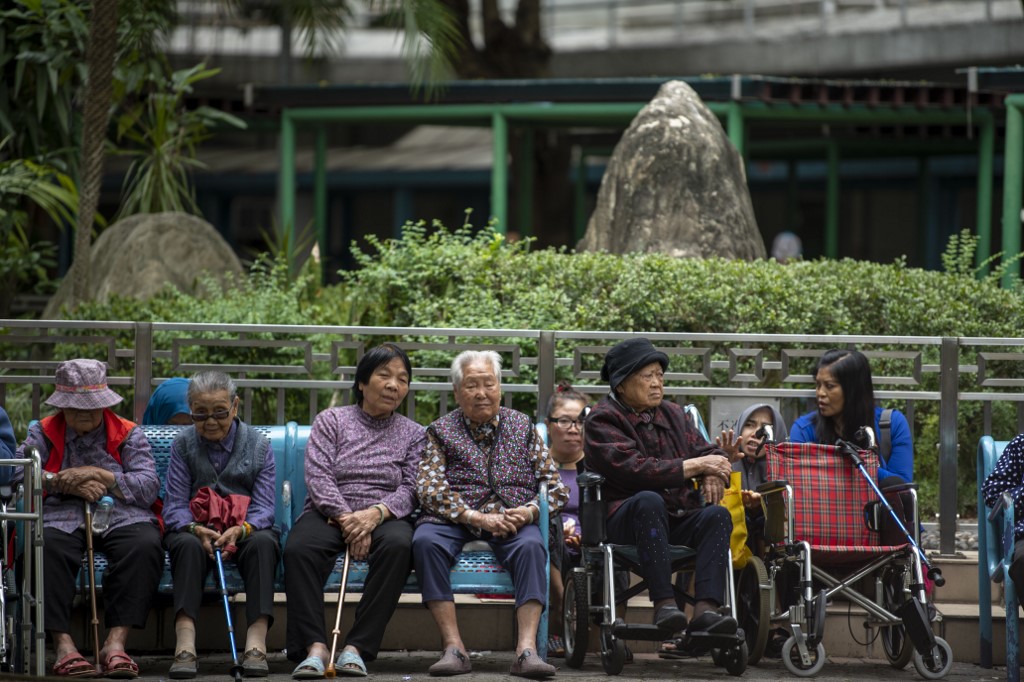(ATF) As China becomes an increasingly online country the government is encouraging innovation to help get its 300 million elderly citizens into the digital world.
As China increasingly becomes digital it creates a wealth of problems for its old citizens. Having gone through a baby boom in the 1950s to the 70s, when Chairman Mao encouraged people to have have as many children as possible, to the one-child policy in later decades, China has an unbalanced and oversized number of elderly citizens. And if they can learn the conveniences of technology, it would benefit them, and the country.
“Online registration and smart terminals are too difficult to learn” – this just one of the elderly gripes over the “smart” technology that brings convenience to young people. But there is a “digital divide” with the elderly, illiterate and others who dislike the internet or other facets of modern technology. As Chinese characters are hard to grasp, and time-consuming to learn, some citizens, especially the poor in remote rural areas, do not have a firm grasp of written Chinese.
In November 2020, the State Council issued an “Implementation Plan on Effectively Solving the Difficulties of the Elderly in the Use of Intelligent Technology”. This responded to social concerns and focused on travel, medical treatment, consumption, entertainment and issues related to elderly citizens. Over the past two decades, various provinces and cities have introduced policies to help the elderly bridge the “digital divide”, to help the elderly to embrace the internet era.
Beijing: help for those who still want to pay in cash
In Beijing, officials want to make it more convenient for the elderly to travel, shop, and seek medical treatment. The Beijing Municipal Development and Reform Commission and the Municipal Health Commission issued a joint notice recently, proposing to establish a joint system in the capital to solve difficulties the elderly have in using “smart” technology. On Monday (Feb 22), the person in charge of the Municipal Development and Reform Commission said that 52 specific measures would be implemented this year to help elderly citizens manage multiple scenarios they frequently encounter, such as medical treatment, shopping, and travel.
For example, simplifying the process for online medical services, providing voice guidance, manual consultation and other functional services for the elderly; setting up manual cash payment channels for high-frequency consumer venues, basic public service fees, and administrative fee collection units, plus promoting digital ID cards for the elderly, plus social security cards and other documents, are in the works.
This year officials in the capital will issue “Beijing’s Work Plan for Continued Improvement of Rejection of Renminbi Cash” to have a centralised system because old people are often unable to use mobile phone payment systems, which are now ubiquitous and many outlets refuse to accept cash payment.
Zhejiang: smart technology training
On January 5, officials in Zhejiang province passed “Regulations on the Promotion of Digital Economy”, which are due to be implemented from Monday (March 1). This is first local regulation to promote the development of a digital economy. But it has clear provisions for hot issues, such as improving digital literacy of all citizens and easing the “digital divide” with the elderly.
And, in order to solve difficulties the elderly have in using “smart” technology, the official website of the Hangzhou Municipal Education Bureau released a “Working Plan for the Popularisation of the Daily Application of Smart Technology for the Elderly” last Sunday (Feb 21). This aims to help the elderly through training so old citizens can enjoy a “smart life”. By the end of 2022, elderly citizens “should be fully trained” and have far better skills in using “intelligent” technology. The programme will focus on courses that involve daily scenarios such as the use of health codes for transport, registering for medical appointments, contact with relatives and friends, making payments, as well as learning about mobile phones.
Tianjin: Helping with hailing a cab
On January 28, Tianjin Municipal Development and Reform Commission released a similar plan to solicit public opinion. A total of 20 measures were listed, to try to solve problems with “smart technology” applications being used for health codes, booking taxi rides, and hospital registration for the elderly.
Medical institutions at all levels have set up “service points for the elderly” and opened “uncoded admission service channels.” The Municipal Public Transport Group docks with the Tianjin Health Code with a colour verification interface, so people aged 65 and above can swipe their ‘Respect for the Elderly Card’ to take a bus without having to display their Health Code. The Health Code is a person’s digital status in relation to whether a person has been exposed to Covid-19.
In terms of taxi travel, Tianjin plans to increase e-hailing services and guide the elderly to use them. In shopping malls, hospitals, supermarkets, large residential areas and other places, local officials will set up taxi call stations.
Shanghai: 1 million elderly targeted for training
At session of the Shanghai Municipal People’s Congress that opened on January 24, the “digital divide” was listed in the city work report.
This year, Shanghai officials, who like to do everything better than other areas, will focus on advancing the city’s digital transformation. The work report says it is necessary to promote a digitalisation of life, to improve service capacity of internet hospitals and ‘smart’ elderly care, while improving the technology with barrier-free services, and helping the elderly and disabled to do all this.
On January 25, Shanghai Municipality announced projects for the private sector this year, including the launch of activities to improve the ability of one million elderly people’s use of “smart” technology. Shanghai has had universities for elderly people for decades, but this is project aims to embrace as many elderly as possible.
Jiangsu: Simpler phones sought for elderly people
As a province with a large population and economy, Jiangsu has a large elderly population. On January 21, officials in this eastern province listed elderly people’s difficulties in using ‘smart’ technology as a key task, and came up with 50 specific measures for travel, medical treatment, consumption and other matters, that need to be clarified and tackled.
Jiangsu’s ‘Task List’ proposes expanding special ‘smart’ products for the elderly based on usage habits and their needs in terms of adapting to internet websites and mobile apps closely related to the lives, in a bid to improve their experience and quality of life. The government wants ‘smart’ products such as mobile phones that have large screens, large fonts, high volume, large battery capacity, simple and more convenient operating features.
Nationwide roll-out
All provinces have announced similar innovation lists. Qingdao, in the northeast, has proposed measures such as optimizing offline channels, plus service facilities and equipment, and implementing precise assistance agencies, and retaining cash payment.
Gansu will focus on parks, sports fitness venues, tourist attractions and other places and retain service windows with real staff inside, as well as land telephone lines, and reserve some offline reservation-free entry and ticket purchase outlets for the elderly.
Yunnan Provincial Development and Reform Commission and the Provincial Health Commission have also called on relevant departments and agencies to mobilise urban and rural communities, plus aged-care facilities, elderly education institutions, elderly groups, family members, and volunteers to help the elderly improve their use of smart technology. Henan provides multiple registration methods such as on-site, telephone services, and online appointments, while also retaining a percentage of on-site services.
























